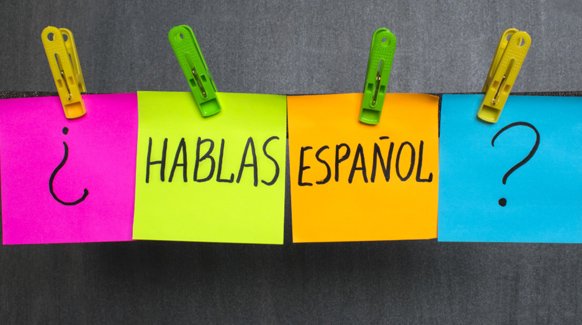Did you know that Spanish is the 3rd most spoken language in the world with more than 500 million speakers? It is the official language in Spain and in Latin America, it derives from Latin like all Romance languages, but it has also some influences of Arabic. For this reason, it is very charming.
However, Spanish is a phonetic language where letters are pronounced consistently, and each letter represents a certain sound. This could make Spanish appear a quite simple language to learn, especially when it comes to spelling and speaking, but do not forget that there are a lot of grammatical rules to remember.
That is why we propose some suggestions for learning and improving your Spanish language knowledge through some engaging tips. Would you like to discover how to make your learning process more interesting and interactive? Follow our suggestions and become a great Spanish speaker while having fun!
Content
HideLearn Spanish by podcast and improve your vocabulary
If you are learning a new language, you will probably know that communication skills are the most important ones. Therefore, if you want to spend more time listening and learning Spanish throughout your day, you should start using a podcast! It is a great way to complement your learning, no matter what level of Spanish learner you are. Indeed, you will surely find a podcast that can help you.
Podcasts are a great way to learn the language because apart from teaching you a lot, they are usually quite entertaining. They have several benefits, and they will help you with the improvement of comprehension, pronunciation and with reading and writing skills.
Also, podcasts can always be with you during your day, so that you could continuously improve. We would like to recommend some podcasts so, check out this list of some of the best podcasts for learning and practicing Spanish.
- “Notes in Spanish” is a podcast presented by a couple, Ben and Marina, who live in Spain. Marina is Spanish and her husband Ben is British, and together they have been creating podcasts and other Spanish learning material since 2005. Their podcasts are divided into beginner, intermediate, and advanced levels, so you can start listening at the level you feel most comfortable. In their podcasts they have real conversations that cover many interesting topics such as culture, news, family, travel, life in Spain, and more. The episodes last between 15 and 30 minutes.
- “Radio Ambulante” is a Spanish language podcast and you can listen to all kinds of engaging stories about people in Latin America. They cover current events, cultural, historical, emotional, and many other topics. The host of the podcast, Daniel Alarcón, is Peruvian, but each episode features different Spanish speakers from all over the world. The episodes last an average of 30 minutes, and you can listen to this podcast and access its transcripts as well as English translations for free. Therefore, it is mostly recommended for high-intermediate and advanced learners who want to expand their vocabulary by listening to great stories in Spanish.
- “Hoy hablamos” is a unique podcast series and there is a new episode every weekday (from Monday to Friday). The host has an exquisite native pronunciation (European Spanish), and the quality of the audio is good. Each episode lasts between 8 and 15 minutes on average and covers one topic. Hoy Hablamos covers a lot of different topics and in addition to the daily podcast, they have a grammar podcast (Hoy Hablamos de Gramática) you can listen to for free every Wednesday.
Learn Spanish with TV series
Are you a great fan of films or TV series? Do you know you can improve your Spanish knowledge just sitting on your couch? How can you do it? Well, you only have to pick up some Spanish TV series or films on the basis of your interest and have fun by watching it! This is always a great way to practice the language you are studying because you will learn about everyday Spanish and its culture.
Sit down and get comfortable because it’s time to stream some learning! Here we suggest some Spanish TV series you can watch to become a real Spanish speaker:
- “Extra” is the perfect starting point for any beginner. It’s made to help people get into learning Spanish, so the dialogue is easy to follow. Set in a very similar formula of the popular Friends TV show, Extra is about an American man who goes to Barcelona. There, he makes friends with a group of people who help him learning Spanish. It’s a story of struggle that any bilingual can understand, presented in a way that makes learning much easier for you.
- “La casa de papel” is one of the most known TV series now. The show tells the story of a mysterious man called “El Profesor” and how he trained a group of people to become the best robbers ever. Since the story is so modern, you get the advantage of hearing some slang that Spanish people use in everyday life and the plot makes it a very interesting show. You might even forget that you’re learning Spanish while you watch it.
- “Las chicas del cable” follows the story of a group of young working women in 1920’s Spain who start work at a telecommunications company in Madrid. The series tackles some deep topics such as the difficulties women faced in 1920’s Spain with respect to their professional lives in a hugely male-dominated domain. The theme of friendship is one of the most important aspect in this series. You will enjoy it for the characters as they are perfectly acted and even though it can be over-dramatic at times, it’s a super entertaining series that will make you laugh, cry and scream for joy. The language used is modern and the standard European Spanish it’s a good one to watch for all levels of learners.
TV series are not the only way you could take into consideration if you want to improve your Spanish: movies are also a great source! Indeed, we have also though about film lover by providing you some titles you should take into account if you want to spend two engaging and educational hours. Here are some suggestions:
- “Perdiendo el norte” is a movie about two Spanish brothers who move to Germany to work after the beginning of the economic crisis. This is a more traditional comedy, but the jokes are pretty funny, and the subject is a good one to learn something about the Spanish culture.
- “Contratiempo” is a movie about a successful businessman who is having an affair on his wife. During a weekend away with his lover, he wakes up one morning and he finds out that she has been killed while the police is already knocking on the hotel room door! With the help of his lawyer, he must build his defence. As the case unfolds, more secrets come to light!
Learn Spanish by reading books
Reading in Spanish won’t only make you feel more confident about your language skills, but it will also improve them. It could expand your vocabulary and also help internalize the language you already know. In addition, seeing the words written on the page will help your memory remember the words and help you recall it later. There is also less anxiety involved in reading than when you’re trying to get your message across verbally. In fact, reading is probably the most stress-free activity you can do to learn a language. When you read, you can sit back, relax, and just take it all in at your own pace.
Even in this case we would like to help you choosing the best books for you and we give you some suggestions:
- “Papelucho” – M. Paz, is a fictional book written from the perspective of a young boy, Papelucho, who lives in Chile. Papelucho goes on different adventures around his home in Chile and writes about them in his journal. This book is written as his journal, making it very easy for beginners learning Spanish to read. Although this book is directed to young teenagers, those who have read Papelucho say that a reader of any age can relate to the stories of his adventures. There are 12 books in this series, so it will keep you busy as you move forward in your language skills.
- “Como agua para chocolate” – L. Esquivel, is a perfect book for those who have mastered the basics of Spanish and are ready to move onto a more advanced level. This book is a Spanish classic and follows the main character, Tita. Tita is in love with the man her sister is about to marry. However, she cannot do anything about it because it’s her duty, as the youngest sibling, to stay and take care of her mother as she becomes older. At the beginning of each chapter there is a recipe of a Mexican dish, so not only will you improve your Spanish reading skills, but you may also pick up the recipe for a tasty dinner as well.
- “La vida imaginaria” – M. Torres, is a wonderful story, driven by “Nata”. After being left by her boyfriend, Nata has to face life anew. The reader follows Nata through her post-relationship recovery as she grapples with her past and present circumstances. This is Spanish journalist Mara Torres’ first novel. It’s one of the few books on the list not aimed at children or teens and the language used reflects this. Despite this, it’s still simple enough for a beginner and you’ll be able to learn a lot of colloquial words and phrases from this novel. It’s a good option for beginners who aren’t interested in reading a children’s book, and it’s less than 200 pages long! You’ll be finished in no time.
Learn Spanish by music
Did you know that know that Spanish speakers talk with a lot of passion and speed? And did you know that you can get used to their accent by listening to music? Music can help second language students acquire grammar, vocabulary and improve spelling in an easier way. Moreover, songs are engaging and always easy to remember!
Have a look at some interesting songs we would like to recommend in order to improve your Spanish:
- “Bonito” - J. De Palo, is a song you should use if you want to learn present indicative, gender agreement and listening comprehension.
- “Me voy”- J. Venegas, is a song that tells the story of a woman who leaves her lover and must say goodbye, even though she does not want to. The lyrics use common Spanish words along with a slow, easy beat—which is perfect for Spanish learners. Most of the song is in the present tense, though there are a few more complicated forms, like the subjunctive.
- “Manos al aire” - N. Furtado, is a foot-tapping pop song with a strong beat, but it’s not sung quickly at all, giving you a chance to catch the lyrics with ease. There are several Spanish colloquialisms, so you can practice listening to everyday, informal sentence patterns.
- “La camisa negra” – Juanes, you will learn the use of “por as in “because of” and what “ya + no” means, apart from a lot of idioms and new vocabulary.
- “Me gustas tú”- M. Chao, is one of the easiest songs for students who are still learning Spanish. There is a lot of new vocabulary and simple sentence structures.
Boost your language skills by taking live classes on Skype
These tips can be very effective if you want to learn Spanish or simply improve it. In this way you can follow our suggestions and do these activities also during your free time without feeling bored! You will learn how to pronounce a word, or the way in which it is spelled correctly. They are very educational, interesting, and particularly engaging ways to become a great Spanish speaker.
Nevertheless, for an effective learning it is also important to compensate your self-study by some Spanish lessons, by practicing and by getting feedback. Would you like to start some Spanish lessons with professional teachers? Are you wondering where you can find it? On coLanguage, of course! On our platform we offer online or in person classes to improve your abilities.
Your classes will be totally personalized and if you are looking for some group lessons to discuss and share your knowledge and ideas with other people, coLanguage is the best choice! In this way you can learn with friends, colleagues, family or other people you know and enjoy a dynamic and interactive class. You can communicate, support each other and exchange ideas to make improvements quickly. However, if you prefer individual lessons on our platform, you will find the perfect tutor who will surely meet your needs. So, follow our advice and try to combine these three important steps to progress very quickly!







